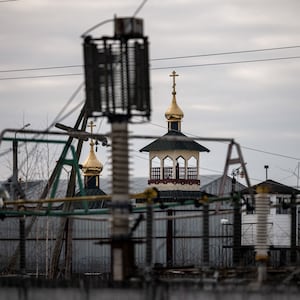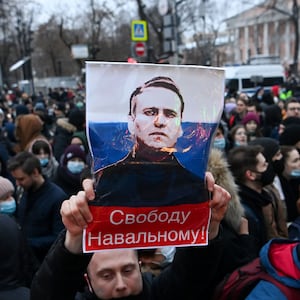MOSCOW—In Russia, dissidents, opposition activists, and journalists by the dozen have languished in jail for years as political hostages—pawns in Vladimir Putin’s diplomatic games with the West.
But now, there is a glimmer of hope, at least for American prisoners, that the Biden-Putin meeting in Geneva on Wednesday could bring them freedom.
On Friday, Putin said that he is willing to swap Americans jailed in Russia for Russian citizens imprisoned in the U.S. “We hope very much we can establish this process with our American partners,” he said in an interview with NBC.
Before the pandemic, the Kremlin’s propaganda news agency, RIAFAN, claimed there were about 100 American citizens serving prison terms in Russia, and about the same number of Russians in American jails. Putin denied that on Friday, saying that there are many more Russians in U.S. prisons. The numbers “do not even compare,” he claimed.
Some of the prison swaps could involve Russian arms dealer Victor Bout and Konstantin Yaroshenko, both of whom are serving sentences for conspiracy to transport drugs to the U.S. On the other hand, two ex-U.S. Marines surfaced on Biden’s agenda: 51-year-old Paul Whelan and 26-year-old Trevor Reed.
Whelan, the more famous of the two, was sentenced to 16 years on espionage charges last year, after his arrest during a visit to Moscow in 2018. Vladimir Zherebenkov was appointed as his lawyer a few days after the FSB arrested Whelan in his hotel room near Red Square.
Whelan’s family members maintain his innocence, and U.S. intelligence agencies have denied that Whelan was a spy.
“Our family considers Paul a hostage of the Russian government,” Whelan’s twin brother David told The Daily Beast.
“I would neither respect our leader, nor Biden, if they don’t agree to extradite Whelan,” Zherebenkov told The Daily Beast. “Paul is innocent. He did not cause any damage to our state but it costs taxpayers’ money to keep him here. They should let him go.”
Zherebenkov told The Daily Beast that he visited his client last week. “Whelan and at least two more U.S. citizens are kept in that prison colony,” Zherebenkov said, referring to the jail housing Whelan, built by Stalin in 1931, deep in the woods of the republic of Mordovia.
“I have defended many Russian police investigators, prosecutors and military officers, and many broke,” Zherebenkov said. “But Paul is a real tough soldier, it amazes me to see how positive his spirit is.”
Kremlin special services “are extremely serious” about American military personnel on Russian soil, especially “in times of the hybrid war,” Sergei Markov, the Kremlin’s political technologist, told The Daily Beast.
According to Markov, Putin has a variety of issues he'd like to discuss with Putin at the summit.
“Primarily we want [Biden] to stop NATO’s expansion towards our border. He should accept that no Navalny, a Western agent, will run for the election,” said Markov. “So after seven years, the U.S. should stop trying to topple Putin [and] put an end to the hybrid war against Russia,” Markov added.
In Whelan’s case, Markov said, “Most probably Putin would ask for Viktor Bout in exchange for Whelan, depending on who of the Russian prisoners cooperated with our security more.”
A legendary arms trafficker known as “Merchant of Death,” Bout was arrested in a DEA sting operation in Thailand in 2008 and sentenced in 2011 to 25 years in jail. The charges against him include attempting to sell heavy weapons, dozens of surface-to-air missiles and thousands of AK-47 rifles, to what he thought were representatives of Revolutionary Armed Forces of Colombia (FARC). He was also accused of conspiring to kill Americans.
Zherebenkov says U.S. diplomats do not like the idea of swapping prisoners. “They are concerned there would be more hostages taken, if a trading precedent” occurs,” he said.
Putin has a long track record of turning liabilities into assets and the latest, grim turn of events with Alexei Navalny is no exception. Navalny, whose courage and stubborn resistance impresses even Putin supporters, was severely sick for weeks while on a hunger strike. Oscar and Nobel prize winners, leading scientists, and celebrities around the world urged Russian authorities to allow Navalny’s private doctors to examine him.

Many of Navalny’s friends and supporters fled the country after authorities banned Navalny’s movement, labeling it “extremist.” Prominent dissident Dmitry Gudkov had to flee to escape potential arrest, but his relative is now facing charges. “To stop me from running for parliamentary elections, they took my old aunt as their hostage,” Gudkov said on TV Rain.
There is a long tradition in Russia of pressuring dissidents as leverage in relations with the West, and all the signs point to the Kremlin turning Navalny and his supporters into just another bargaining chip.
“The late Soviet leaders were quite happy to trade their dissidents for communist spies imprisoned in the West,” Daniel Treisman, a professor of political science at the University of California at Los Angeles told The Daily Beast.
Positioning imprisoned dissidents as bargaining chips with the West served other purposes, too. The dissidents could be stained in the eyes of Soviet society as spies or at the least allies of hostile Western powers, much like the Kremlin is accusing Navalny of working for the Central Intelligence Agency today, without presenting any evidence.
Outside of spy swaps, simply easing pressure on dissidents could yield concessions from Western nations.
Navalny would most probably refuse to be swapped, no matter how terrible his health situation, though authorities could still trade small moves, such as providing better medical care for political dividends. But should the West allow Putin to use the fates of Russian dissidents or American political prisoners as currency, brought to the market?
Yulina Latynina, a prominent Russian writer, doesn’t think so.
“During his epic conversation with Putin, for the first time as far as I can remember, Biden did exactly what Putin expected,” Latynina said on a Russian radio show. “Here is the combination Putin leads with: Don’t talk with me about Navalny, then I will not attack Ukraine in exchange.”
It has been humiliating for Putin supporters to see the world’s leading human rights groups giving imprisoned Navalny prestigious prizes. Local liberal politicians praise Navalny as Russia’s own Nelson Mandela or Lech Walesa. The possibility of a 2021 Nobel Peace Prize going to Navalny in October would be unbearable.
Meanwhile, Navalny’s family, friends and supporters hope he survives his prison term—and dream of a Russia where political hostages are a thing of the past.




